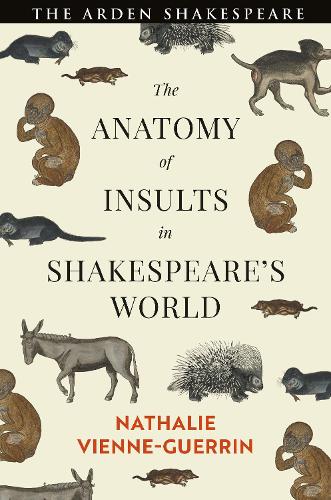
The Anatomy of Insults in Shakespeares World
(Hardback)
Available Formats
Publishing Details
The Anatomy of Insults in Shakespeares World
By (Author) Dr Nathalie Vienne-Guerrin
Bloomsbury Publishing PLC
The Arden Shakespeare
16th June 2022
United Kingdom
Classifications
Tertiary Education
Non Fiction
Literary studies: c 1600 to c 1800
822.33
Physical Properties
Hardback
336
Width 126mm, Height 206mm, Spine 24mm
460g
Description
The Anatomy of Insults in Shakespeares World explores Shakespeares complex art of insults and shows how the playwright set abusive words at the heart of many of his plays. It provides valuable insights on a key aspect of Shakespeares work that has been little explored to date. Focusing on the most memorable scenes of insult, abusive characters and insulting effects in the plays, the volume shifts how readers understand and read Shakespeares insults. Chapters analyze the spectacular rhetoric of insult in Henry IV, Troilus and Cressida and Timon of Athens; the skirmishes of wit in Much Ado about Nothing and A Midsummer Nights Dream; insult and duelling codes in Romeo and Juliet, As You Like It and Twelfth Night, the complex relationships between slander and insult in Much Ado about Nothing and Measure for Measure; the taming of the tongue in Richard III and The Taming of the Shrew, the trauma of insults in Othello, The Merchant of Venice and Cymbeline and insult beyond words in Henry V and King lear. Grasping insult as a specific speech act, the volume explores the issues of verbal violence and verbal shields and the importance of reception and interpretation in matters of insult. It offers a panorama of the Elizabethan politics of insult and redefines Shakespeares drama as a theatre of insults.
Reviews
Wide-ranging, accessible study of the power of insult across Shakespeare dramatic oeuvre. With its incisive, historically-informed close-readings and attention to the cultural resonance of different forms of insult, this work sheds light on the role and significance of insult within Shakespeares plays and in Elizabethan culture more broadly. * Cathy Shrank, University of Sheffield, UK *
Author Bio
Nathalie Vienne-Guerrin is Professor in the English department of the Universit Paul-Valry Montpellier 3 and a member of the IRCL, Institute for Research on the Renaissance, the Neo-Classical Age and the Enlightenment (UMR 5186 CNRS), France.
